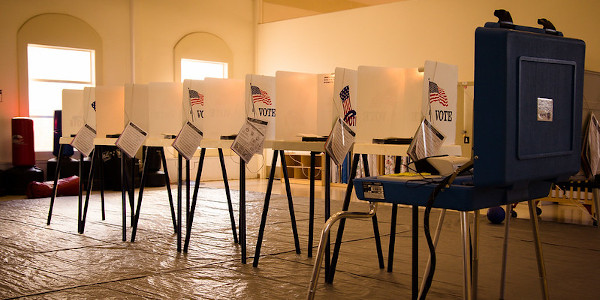Can we ensure a healthy and trustworthy 2020 election?
Ten recommendations from MIT election expert Charles Stewart III and Nathaniel Persily of Stanford Law

Voting booths in Los Angeles county in 2012; photo by Stephen Velasco
"Despite the challenge presented by Covid-19, the 2020 elections must go forward. The elections to be held on November 3 are not optional. They cannot be postponed, even if dangers to public health remain as great as they are likely to get over the next few weeks."
— Charles Stewart III, Kenan Sahin Distinguished Professor of Political Science, and Nathaniel Persily, James B. McClatchy Professor of Law, Stanford Law
Research and Perspectives for the Pandemic
Main Page | Election 2020
EXCERPT | LAWFARE | MARCH 19, 2020
"It is quickly becoming apparent that the Covid-19 pandemic will fundamentally change the 2020 election. The government’s response to the crisis will affect voters’ perceptions of candidates, to be sure — but the pandemic will also affect whether and how citizens vote in the primaries and the general election. As state and local officials try to navigate an unprecedented situation, their response to the pandemic has been uneven and uncertain....
"American democracy has endured a civil war, two world wars and the flu pandemic of 1918. The U.S. held elections during all of those life-changing and democracy-endangering events. The Covid-19 pandemic...requires an extraordinary commitment at all levels of government, and from the media, political parties, campaigns and voters. The country can meet this challenge if Americans begin to prepare immediately."
Summary of the Ten Recommendations
1. The United States must plan for a significant shift to mail balloting for the 2020 election.
2. The nation must commit to supporting the logistical effort necessary to conduct mail elections with integrity and efficiency.
3. Any efforts to expand voting by mail in time for the November election must appreciate the partisan polarization surrounding changes in election rules.
4. States should approach this situation as an emergency, not as an opportunity to make long-term changes to election policy.
5. States need to reconsider the division of labor between state and local authorities in the conduct of elections.
6. Election officials need to be working with the Postal Service immediately to ensure a smooth transition to expanded mail balloting.
7. States need to communicate clearly to voters how mail ballots will be distributed, and develop plans such that ballots actually get to the voters intended.
8. In-person voting won’t go away.
9. Election officials need to communicate with the public to address the anxiety that is likely to attend the counting of votes.
10. Adjustments to voting rules must respect behavioral regularities that voters have demonstrated over the years, and are unlikely to change, even in the midst of a public health crisis.
Suggested links
Charles Stewart III's MIT webpage
MIT Election Data and Science Lab